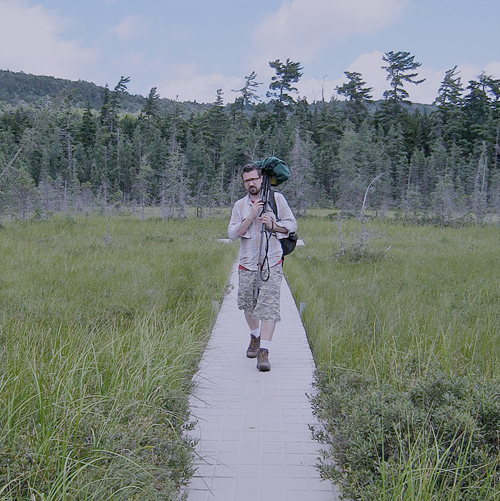Interview with David Michael
Interview by Chris Whitehead
‘The slaughter house’ is a controversial phonographic release composed by sound artist David Michael and published by german label Gruenrekorder. On this work the artist captured sounds on a slaughterhouse in Alabama which on an initial sight could be a rather difficult subject to address in terms of the ethical and moral aspects involved. Intrigued by this release, our editor Chris Whitehead interviewed the artist about this work and here we have the answers. We would like to thank David Michael for his time and interest in our questions.
-Alan Smithee
Q (Chris Whitehead). From what point of view did you set out to record Slaughterhouse?
A (David Michael). Originally I was interested in making a ‘nature recording’, but from the perspective of a part of nature that is typically ignored in the genre, specifically themes of death and the like. Much of the time all you hear is lush springtime choruses, ultra-quiet idyllic soundscapes, life in full bloom.
Q. It begins with birds.
A. It does – I suppose I was trying, not too subtly, to set the contrast.
Q. It also ends with going back to nature.
A. This decision was perhaps more compositional. It was actually how my own experience there ended (and began for that matter), but it also ties together the record – idyllic nature on either side of dismemberment.
Q. I notice there are no pictures in the packaging.
A. I was told very specifically that I was not allowed to photograph or video. The owners and butchers were deeply paranoid about PETA showing up and giving them grief. Apparently it had happened before. They thought that any pictures would lead PETA or other activists right to their door, so I didn’t take any.
Q. Why did they agree for you to record then? Was a lot of persuasion involved?
A. There was very little persuasion, I called up the establishment and talked with the owner who said I could record. It really was that simple.
Q. Was it difficult to watch?
A. At first yes, but it’s not shocking. It’s natural, like having a baby or something like that. It makes me think about when my son was born – seeing him for the first time – it was like “oh yeah, of course”.
As far as I can tell, ‘slaughter’ is as old as human civilization itself. On a deeper level, all carnivores kill, and while humans are not strictly carnivores, we are certainly part of this system of devouring other living things.
Q. It didn’t put you off meat?
A. Not at all, in fact we went out to lunch mid-day for a BBQ. It’s not because we are totally insensitive, it’s because that’s what people do. Well, not all of us, obviously.
Q. During the recording you say the line between life and death is fuzzy. I found that intriguing.
A. Me too! They disagreed with me, but the cow (which they called ‘beef’) was still alive in many ways. It was not consciously alive as the bullet to the brain knocked out that system, but the other systems were still mildly functional. The heart still beat until there was no more blood.
Q. Kind of electrical muscular activity?
A. Oh definitely. The muscles twitched, skin shook, the systems were not working well together any more, but much of the animal was still alive, and I assume remained so until the freezer.
Q. There’s a bit where the guy says ‘don’t get brave and step in there will you?’, and you go ‘absolutely not’.
A. Yeah, he warned me that after they put down an animal it still can get violent and kick and whatnot. I had approached her really close after he shot her, which really agitated him. I think he saw it as disrespectful, which in hindsight it probably was.
Q. To whom?
A. The animal.
Q. I can’t quite grasp the relationship between the men and the animals?
A. I can’t either. The father seemed less conflicted about it, less analytical. I actually think that the young man’s faith led him to some hard internal questions. He told me stories about how others in the community had called him a murderer. These are folks at his church, but this was his family’s profession, for better or worse. It’s not like there are loads of job options in this area and honestly, i don’t know that he wanted to do anything else. He was very good at this job, he was trained by his father.
Q. The religion, the blood and the death conjour up a gothic atmosphere, or is that too simplistic?
A. Not simplistic at all. One of the aspects of this recording that I had not bargained for is that it is so sparse. The process is almost entirely visual, really the only thing that is left for the listener is their own mind. The religious aspects were completely unplanned. I had no idea the young man would be so devout – evangelical even. The other thing I came to realize is that for these men, this is a daily affair.
Q. There is a lot of hosing down of hard surfaces.
A. Yes, there was a lot of blood, fluid, dirt and excrement. The hose is essential in cleaning up the beef. The animals very literally just arrive from the field with all the earthly contamination you might expect. Customers would drive them up in trailers.
During the day they slaughtered 2 animals, a cow and a young buffalo, both females. I was not allowed to watch them putting the buffalo down. They used a very high powered gun and the owner didn’t want me around.
Q. Do we hear the buffalo shot as you walk away on the last track?
A. Yep – that’s the one. That one actually really freaked me out. I think it was not being able to see what was happening that made it different, but after they shot the buffalo I found myself really shaken.
When it’s something you are involved in, it’s rational, it’s natural. When you are not involved, it’s execution. This may be like anything – when you are a part of something, you can rationalize it. When you are not a part of it, you critique it – in this case I can see how it’s easy to get activist about slaughter when you have not been a part of it. I actually don’t have a position on the morality of eating meat.
Q. So should listeners file this under nature recordings?
A. I find it surprising that anyone would listen to it at all, in fact, I feel like the idea of the recording is enough – I could probably have left it as a conceptual piece. I think you will find that the nature recordists would squarely reject this as a nature recording, which is fine. The content is not really in line with the genre, though the inspiration for the recording was directly from the genre.
[David Michael photo courtesy of Impulsive Habitat]



